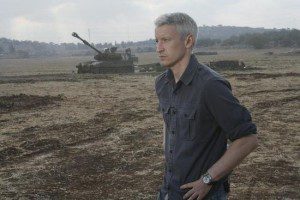 Cable News Network (CNN) anchor Anderson Cooper didn’t exactly rattle the rafters with a collective gasp of public surprise when he announced that he was gay. Though it’s been something many speculated about for some time, he had never spoken about his sexual orientation in the public forum until today.
Cable News Network (CNN) anchor Anderson Cooper didn’t exactly rattle the rafters with a collective gasp of public surprise when he announced that he was gay. Though it’s been something many speculated about for some time, he had never spoken about his sexual orientation in the public forum until today.
In fact, according to a story in the Huffington Post, he rebuffed a question on the matter from a New York Magazine reporter recently, suggesting that he simply did not make a habit of talking about such things in the media, citing the need for neutrality in as many ways as possible as a reporter.
Then, in an email to writer Andrew Sullivan, Cooper “came out,” stating the following in the letter:
“It’s become clear to me that by remaining silent on certain aspects of my personal life for so long, I have given some the mistaken impression that I am trying to hide something – something that makes me uncomfortable, ashamed or even afraid. This is distressing because it is simply not true. I’ve also been reminded recently that while as a society we are moving toward greater inclusion and equality for all people, the tide of history only advances when people make themselves fully visible.”
I put the fact that Cooper “came out” in quotes namely because he had not made his sexuality a secret before. He appeared publicly with a partner, and was open about being gay with friends and family. And although it has become increasingly common for stars to speak plainly about their orientation, Cooper also realized that his perceived neutrality could be compromised in some viewers’ eyes by stating as much in the wide open.
So why do it? Put another way: why does it matter if Anderson Cooper is gay or not?
It doesn’t really, except for the fact that he identifies with a much maligned minority group in our culture which is regularly denied equal rights because of who they are and who they love. And in taking the relatively small risk of losing some more narrow-minded fans (but perhaps gaining new ones), he helps to advance and empower the movement for equality and affirmation of all people.
Time and again, I have seen that peoples’ minds and hearts are changed about the “gay issue” when it centers on an individual they care about rather than on some abstract set of ideologies. Even Dick Cheney softened his positions on LGBT rights when it became public knowledge that his own daughter was Lesbian.
The fact is that, although most of us in the public don’t actually “know” Anderson Cooper, his presence on television makes him a familiar figure. So when someone has had a number of years to feel comfortable with him as a source for news and reliable, professional commentary, his orientation becomes less of an issue. This often carries over to the next time that person meets someone who is gay, helping familiarize the experience in the future.
The LGBT community has a particular champion in someone like Cooper, too, who doesn’t fit the many stereotypes some maintain for what it means to be “gay.” He’s a manly man. He does’t swish or lisp or any of the other generalizations our imaginations apply to our concept of “gay” means. He is Anderson Cooper, a reporter and television anchor who also happens to be gay, not Anderson Cooper, the gay reporter.











